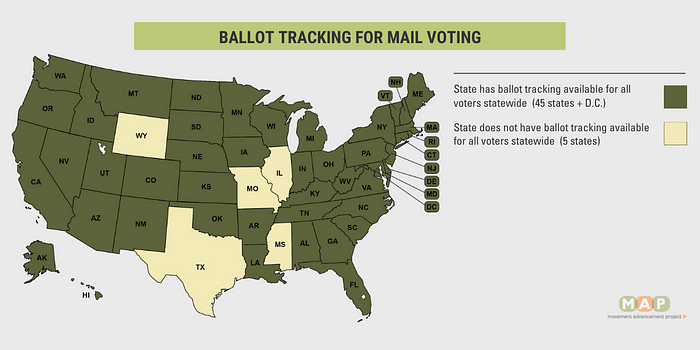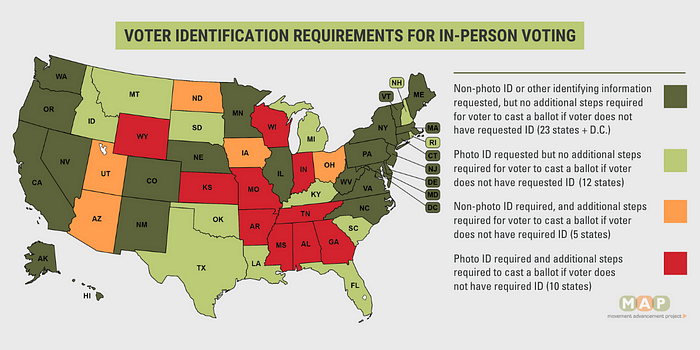State of Democracy Spotlight Series: Wisconsin
With the midterm election fast approaching, Movement Advancement Project’s (MAP) State of Democracy Spotlight Series profiles a different state each week.
This series provides an overview of the current voting landscape, key issues that are coming up in that state, and why it matters for the overall state of democracy in this country. These spotlights outline policies that will impact what voting may look like in a number of battleground states and summarize how voting and election laws have changed since the 2020 election, for better or for worse.
See the full state democracy profile for Wisconsin, which ranks the state in the six categories of policies we track, and details voting and election laws Wisconsin has in place. Previous State of Democracy Spotlights can be found here: Florida, Georgia, Michigan, Arizona, Pennsylvania.
Wisconsin, the final state in our spotlight series, is an important state to watch this November, with a Senate seat and governorship to be decided on by voters. Court decisions on ballot drop boxes and other aspects of mail voting have impacted options for voters and created uncertainty, with little over a week until Election Day. The state’s gubernatorial election is also set to have an outsized influence on the health of democracy in Wisconsin going forward, as Republicans in the legislature have been stopped from implementing a variety of restrictive policies only by the current governor’s veto pen. The 2022 election will decide if Wisconsin will become a stronger democracy going forward or continue to backslide.
Court Decisions in Wisconsin Have Already Impacted Voters This Year, and More Changes Could Come Before Election Day
Ballot Drop Boxes
With less than two weeks remaining until the midterm election, voting rules in Wisconsin are in flux as court decisions change policies and potentially create voter confusion and uncertainty around results. Earlier this year, the Wisconsin Supreme Court issued a controversial decision completely banning the use of ballot drop boxes in the state. The decision means that Wisconsin is now one of only 10 states that ban the use of ballot drop boxes, which are a popular and secure option used by millions of voters around the country.
Third-party ballot return
The court also severely restricted third-party ballot return or collection, meaning that voters in Wisconsin may return only their own mail ballot and cannot receive assistance doing so unless they are disabled. Under this court decision members of the same household, for example, are not even allowed to return mail ballots on the others’ behalf. Only four other states — Alabama, Tennessee, South Dakota, and Virginia — have such strict restrictions on ballot collection.
Additional pending court decisions in the state could have further impacts on voters leading up to Election Day.
Witness Signatures and Address Requirements for Mail Ballots
In ongoing legal challenges, courts have ruled against previous guidance from the state election commission, which had allowed officials to correct mail ballots where the address of the witness was incomplete.
Wisconsin is one of only six states that require voters to obtain the signature of a witness before returning their absentee ballot. Guidance by the state election commission had previously allowed officials to correct ballots where the address of the witness was incomplete. Groups including the League of Women Voters have advocated allow such ballots to be counted. With less than two weeks until Election Day, the latest ruling means that the ballots in question likely will not be counted, barring any further court decisions on the matter.
Ballot Spoiling
Litigation is also ongoing related to a practice called “ballot spoiling,” which allows a voter to cancel their original absentee ballot and cast a new one. Earlier this month, a trial court in Wisconsin ruled that the practice is prohibited. Ballot spoiling has received more attention than usual following the state’s August primary, where multiple candidates dropped out, but their names still remained on ballots. The state court of appeals has temporarily put the lower court prohibition of ballot spoiling on hold while arguments continue, leading to additional uncertainty with just over a week until Election Day.
Lack of Ballot Pre-Processing Will Lead to Delays of Election Results and Increase Danger of Election Denial
Wisconsin is one of only eight states that does not allow pre-processing of absentee ballots before Election Day. The pre-processing of absentee ballots involves taking steps such as verifying voter signatures and opening ballot envelopes so that counting can later be done more quickly; however, it does not involve tallying or releasing results ahead of Election Day.

The inability to pre-process mail ballots means that it takes longer to be able to count all votes accurately and make sure that every vote is counted.
As seen in recent elections, Republican Party officials and elected leaders may again turn this delay of their own making into false theories about election fraud.
Despite repeated calls from election officials in the state, the Wisconsin legislature failed to act to allow the advanced processing of mail ballots necessary to prevent delayed results.
To make matters worse, both the Republican candidate for governor and Senate in Wisconsin have so far refused to abide by a basic tenet of democracy that candidates will accept the results of the elections, even if it means they do not win.
Voters have so far cast twice the number of absentee ballots as compared to the 2018 midterm elections. The deadline to request absentee ballots is November 3. The failure to implement a commonsense policy allowing pre-processing — which 42 other states already successfully utilize — has set the state up for a repeat of the chaos of the 2020 election created by people who did not like the results.
Overall, the lack of pre-processing is particularly problematic given the rise in absentee voting and the ways in which vote count delays are now being used to sow doubt and undermine America’s democracy.
Outcome of the Governor’s Race Could Impact Future Voting Restrictions and Election Challenges
The result of Wisconsin’s governor’s race this year could have a significant impact on future voting rights and the health of democracy in the state. Since the 2020 election, the state’s Democratic governor has vetoed almost 20 election and voting restrictive bills passed by the Republican-controlled legislature. Restrictions vetoed by the governor included proposals to:
- Restrict the availability of the state’s permanent absentee list, where voters can sign up to receive an absentee ballot each election cycle.
- Restrict voting accommodations for voters in nursing homes or who are otherwise indefinitely confined due to illness, infirmity, or disability (these voters are currently exempted from the state’s strict voter ID requirements).
- Give more power to partisan poll watchers to be within closer proximity to voters, raising the danger of intimidation.
- Give the legislature power to interfere in election administration through the ability to block federal and state election guidance.
- Prohibit election officials from filling in incomplete witness information on absentee ballots.
- Ban proactive mailing of absentee ballot applications to voters, an option utilized during the 2020 election.
- Codify a complete ban on ballot drop boxes.
In contrast, the Republican candidate for governor has failed to abide by the basic tenets of our democratic system and refused to say if he will accept the results of the election, regardless of the outcome. In addition, he has committed to undermining the state’s election system by dismantling the state election commission and enacting the restrictive measures vetoed by the current governor. The winner of the governor’s race this year will therefore have a tremendous impact on the health of democracy in Wisconsin going forward.
Wisconsin Ranks Below Average in Terms of Voting and Election Policies
Wisconsin ranks 33rd in the nation in our Democracy Tally for its voting, election, and democracy policies. The Democracy Maps currently track 45 laws and policies for each state, which inform this tally.

Election Security
Despite false claims of voter fraud from elected officials in the state, Wisconsin actually has fairly strong policies to ensure election security, including the following:
- Wisconsin is one of 45 states and D.C. that have mail ballot tracking technology available for all voters. This technology allows voters to ensure that their mail ballot was received and counted.

- Wisconsin also is one of 37 states that ensure secure voting machines for in-person voting, in which are used. These systems prevent hacking and security breaches.
- Notably, Wisconsin is one of 39 states that already require post-election audits that are independent and nonpartisan. This kind of audit allows states to verify the accuracy of results. ensure accurate vote counts and improve confidence in results.
Elected leaders in Wisconsin who are truly interested in election security—as opposed to seeing only the results they like—could also adopt best practice risk-limiting audits, which are also nonpartisan and use statistical methods to verify election results.
Voting in Person
Wisconsin’s lowest Democracy Maps ranking is in the category of Voting in Person.
- The state has one of the strictest voter ID laws in the country, which creates unnecessary and problematic barriers to voting. Voters in Wisconsin and only nine other states are required to show photo identification to cast a ballot and additional steps are required in order to have their ballot counted if they don’t have the required ID. These kinds of voter ID laws were specifically designed to suppress voting and have a disproportionate impact on voters of color and transgender voters.

- Unlike a majority of states, Wisconsin does not require employers to provide paid time off to vote.
Voter Registration
Despite policies to limit voter participation both for in-person voting and voting by mail, Wisconsin has strong voter registration policies.
- The state has adopted a number of the policies we rate positively in this area, which include allowing Election Day voter registration and online registration.
Representation and Participation
- While Wisconsin ranks 27th in the nation in terms of voter registration rate at just under 88%, the state ranked 4th in the nation in terms of voter turnout in 2020 at just under 76%.
- Wisconsin could improve its policy on the restoration of voting rights for formerly incarcerated people by allowing automatic restoration of rights upon release from incarceration. The state’s current policy requires the full completion of post-sentencing, including probation and parole, before rights are restored.
Voting by Mail
- Wisconsin is one of 35 states that allow voters to vote by absentee ballot without an excuse, though the state has a number of concerning restrictions related to voting by mail.
- Wisconsin is one of only six states that require voters to obtain a witness signature on their mail ballots. This additional step can create barriers for voters to participate and also increase the potential of ballots being rejected.

- Wisconsin is also one of only six states in the strictest category of third-party ballot collection policies. Only the voter may return their own ballot. Such restrictions on ballot collection can disproportionately affect Native American voters, disabled voters, and voters living in remote areas.
- After a decision by the state supreme court this year, Wisconsin is one of only ten states that ban the use of ballot drop boxes entirely.
Independence and Integrity
Wisconsin trails in its policies for independent elections and election integrity.
- As noted above, the state lacks currently does not allow pre-processing of absentee ballot processing.
- Wisconsin allows its state legislature to draw its congressional maps, which results in politicians choosing their own voters, rather than voters being able to choose their own elected leaders.
The state could go even further into negative territory in terms of independence of elections if Republicans take full control of state government and enact, for example, laws that allow the state legislature to interfere in election administration for partisan purposes.

